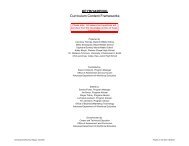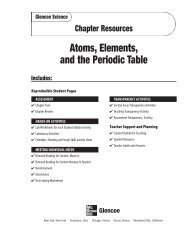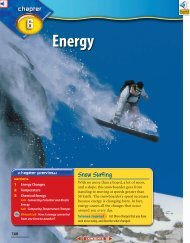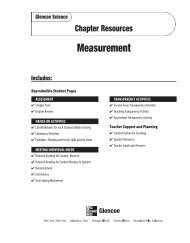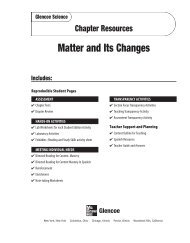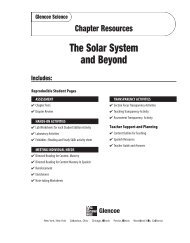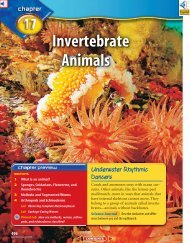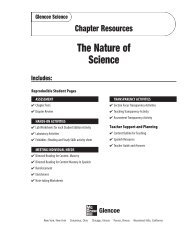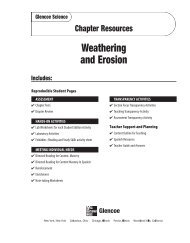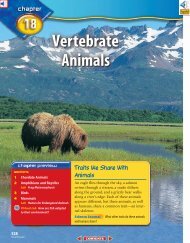chap11 - Learning Services Home
chap11 - Learning Services Home
chap11 - Learning Services Home
- No tags were found...
You also want an ePaper? Increase the reach of your titles
YUMPU automatically turns print PDFs into web optimized ePapers that Google loves.
Time It takes time for rocks to weather. It can takethousands of years for some soils to form. As soilsdevelop, they become less like the rock from whichthey formed. In young soils, the parent rock determinesthe soil characteristics. As weathering continues,however, the soil resembles the parent rock less andless. Thicker, well-developed soils often are found inareas where weathering has gone on undisturbed for along period of time. For this to happen, soil materialsmust not be eroded away and new sediment must notbe deposited over the land’s surface too quickly.Organisms Organisms influence soil development.Lichens are small organisms that consist of an alga anda fungus that live together for mutual benefit. You mayhave seen lichens in the form of multicolored patchesgrowing on tree branches or cliff faces. Interestingly,lichens can grow directly on rock. As they grow, theytake nutrients from the rock that they are starting tobreak down, forming a thin soil. After a soil hasformed, many types of plants such as grasses and treescan grow.The roots of these plants further break down the parent rock.Dead plant material such as leaves accumulates and adds organicmatter to the soil. Some plants contribute more organic matterto soil than others. For example, soil under grassy areas often isricher in organic matter than soil developing under forests. Thisis why some of the best farmland in the midwestern UnitedStates is where grasslands used to be.Humus-rich surface layer----------------------------------------------------------------Intermediate layer-----------------------------------------------------------------Slightly altered parent materialFigure 7 Soils contain layersthat are created by weathering,the flow of water and chemicals,and the activities of organisms.Explain what part microorganismsplay in soil development.SummaryMechanical Weathering•The freezing and thawing cycle breaks up rocks.Plants’ roots and burrowing animals canbreak rocks apart.•Chemical WeatheringSome rocks react chemically with naturalacids.•SoilA factor affecting soil formation is the kind ofparent rock that is being weathered.Self Check1. Describe how rocks are mechanically weathered.2. Name two agents of chemical weathering.3. Explain how carbonic acid weather rocks.4. Describe how soil forms. What factors are important?5. Think Critically How could climate affect rates ofmechanical weathering? What about chemical weathering?How are the two kinds of weathering related?6. Compare and contrast mechanical weathering causedby ice and growing roots.red.msscience.com/self_check_quizSECTION 1 Weathering and Soil Formation 321



